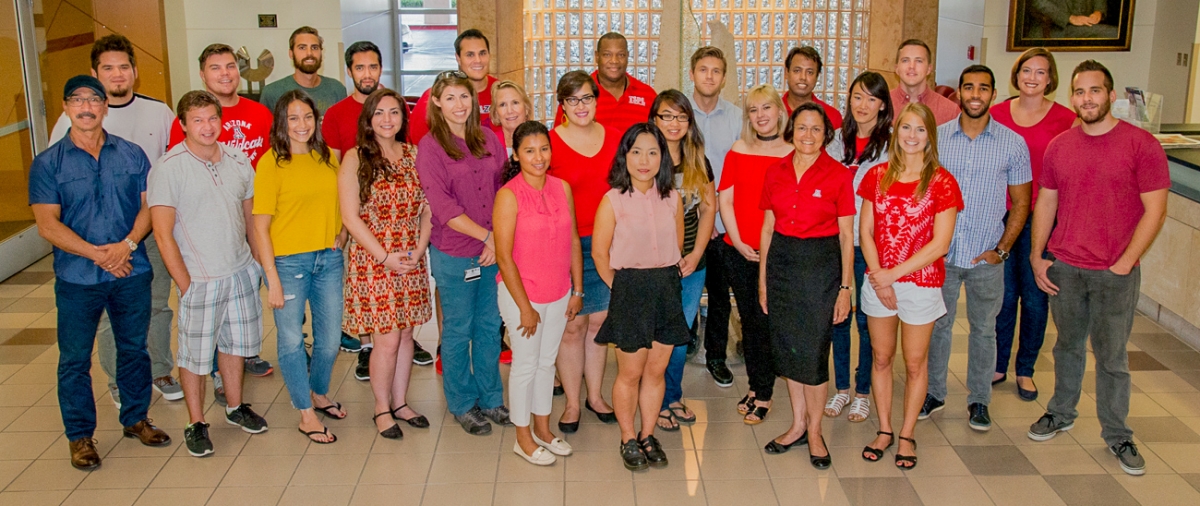
The Cancer Biology Graduate Interdisciplinary Program, at the University of Arizona in Tucson, is a doctoral degree-granting program that emphasizes a translational research approach to address significant problems relating to cancer development and treatment. The Program offers coursework and research opportunities leading to the Ph.D. or M.D./Ph.D. degrees in cancer biology and trains postdocs preparing for careers in academia and industry. The Program prepares its trainees for careers in cancer research through an interdisciplinary approach that involves faculty from a wide range of disciplines at the University of Arizona. A major goal of the CBIO program is to provide trainees with an exciting and stimulating academic environment that inspires innovative cancer research, provides a foundation of knowledge in the scientific disciplines related to cancer research, and exposure to the challenges faced by clinicians who treat cancer patients. Program activities encourage the development of students’ critical thinking skills and provide them with the professional skills necessary for them to develop into successful/impactful cancer researchers.



Getting Started and Selecting a Research Advisor
Graduate students enter the program through an umbrella program, Arizona Biological and Biomedical Sciences Program (ABBS). They choose three research laboratories in which to conduct rotations during the first year. By the beginning of the second year, each student is expected to have chosen his/her research advisor and will have begun work on his/her dissertation project. Students typically complete their qualifying examination by the end of the second year. ABBS draws students from a wide variety of disciplines. Consequently, our students have diverse training backgrounds in science. All are motivated to understand and overcome cancer.



Flexible Curriculum
The CBIO GIDP curriculum is designed to be flexible and can be tailored to each student’s interests and research project. The Graduate College requires that Ph.D. candidates complete 36 units in cancer biology (core classes plus electives 18 of which must be graded units), nine units in the minor, and 18 units of dissertation credits. The minor can be in Cancer Biology or another minor. The requirements for other minors are determined by each program. Students should check that program’s coursework requirements to satisfy the minor. For more detailed information about minors, please refer to the CBIO handbook.
This structure provides students with a rigorous training program yet with maximal flexibility to build a customized set of courses that focuses on the interests of the trainee and the requirements of the research project.


Training Environment
The Cancer Biology GIDP presents a unique environment to pursue interdisciplinary cancer research because it is affiliated with the University of Arizona Cancer Center (UACC), an NCI-designated comprehensive cancer center and is in close proximity to the University of Arizona College of Medicine, and the Banner/University of Arizona hospital. A set of ten Shared Resources are embedded in the UACC and provide Cancer Biology trainees with access to advanced scientific techniques such as high-resolution microscopic imaging, DNA and protein sequencing services, flow cytometry, as well as access to human tissues, and a facility for conducting mouse experiments. Our mouse facility also has the capacity to generate genetically modified animals.
Overall, the training environment is collegial and interactive and one that promotes interactions between the various disciplines associated with the program including the clinical faculty. The effect is that trainee research projects focus on the most relevant and important topics in cancer research. The program also ensures successful and timely completion of the training through annual monitoring of progress and the completion of a career development plan.


Postdocs in the CBIO program
As part of our commitment to producing the next generation of cancer researchers the CBIO program also trains postdocs. Postdoctoral fellows interested in conducting cancer research in the CBIO program should contact CBIO program faculty who are interested in accepting postdocs and medical residents interested in doing research. Once accepted into a CBIO preceptor’s laboratory the postdoc and his/her mentor may apply for support from our T32 training grant. T32 trainees must be US citizen or permanent residents. Duration of T32 support is for two years. T32 postdoc trainees are required to participate in the Cancer Biology Seminar Series, the Cancer Biology Student/Postdoc Research Colloquium and journal clubs and must develop an independent professional development plan. In addition, the Program aids with developing professional skills including writing grants and manuscripts, oral presentations, lab management, and networking.
Program Mentors
Students entering the program can choose from over 50 faculty mentors from 12 different departments and five colleges who provide a broad spectrum of research opportunities. The interdisciplinary structure of the Program combined with the extensive mentoring experience of our faculty provides students with a superior training environment. This combined with a flexible curriculum promotes innovation and allows students to accomplish their educational and training goals and to establish themselves as independent researchers.
A key feature of our Cancer Biology Program is the emphasis on translational research. Hence program mentors also include clinical mentors who actively engaged in treating cancer patients. These clinicians are available to serve on dissertation committees where they provide students with insight into the important clinical challenges they face while treating cancer patients and insight into clinical aspects of cancer diagnosis, treatment, and prognosis.
Student Testimonial
"I appreciate the variety of opportunities offered by this program. I’ve designed a plan of study tailored to my unique interests and career aspirations."
-Leila Lindeman



